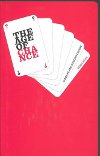

The Age of Chance

Gerda Reith
Reviewed by Joseph Eliot
- Avoid
- Browse
- Buy
- Love
- Never Play Without It
In The Age of Chance, author and eminent sociologist Gerda Reith contends that gambling isn't limited to online and offline casinos. Bets and risks appear in all facets of life, governing our behaviour at every turn. While exploring the consequences and subtleties of gambling, Reith presents the reader with interesting interviews of gamblers, traces the history of betting, and even explores early internet gambling. Although this book was published in 1999, it's not only relevant today but continues to be required reading in various cultural studies and sociology courses. Yet there's no need to be deterred by the author's academic credentials. The Age of Chance is an engrossing read that's easy for anyone to relate to.
Rather than just looking at the face of gambling and speaking of the many ways in which people can gamble for money, in The Age of Chance, Gerda Reith goes much deeper by looking at how we gamble in all aspects of our life. This depth becomes apparent from the very first page of the introduction as gambling is referred to as being symbolic of “mankind’s struggle with uncertainty” – a very interesting idea and one that’s explored throughout the book.
Seeing as Reith is a professor of sociology, the book was always going to have an authoritative voice and even an academic tone. However, one of the great strengths of The Age of Chance is that it reads well and is certainly a cover to cover read. Passages such as “Chance in Britain” and “The Varieties of Gambling Experience” are great examples of interesting yet factual information.
Of particular interest to online casino players will be the section on online gambling. This comes in the Modern Gambling Sites section and provides an intriguing look at how the online gambling industry was viewed in its infancy. As the book was first published in 1999, no one really knew what online gambling was capable of. To illustrate just how young the industry was at the time of writing, Reith’s note that online gambling was only legal in Lichtenstein, Gibraltar and some Caribbean countries certainly puts the timing into perspective.
Even without the benefit of the hindsight that any modern reader will have, Reith makes some very astute observations about online gambling, many of which still stand true today. Obviously a lot has changed in the years since writing, so there are some predictions that we know to be false, however it does provide fascinating viewing to see what was thought of online gambling long before it became the huge industry that it is today.
But past thoughts on online gambling certainly aren’t the only reason this book is a good read, in fact much of what is said about gambling is fairly timeless. “The Experience of Play” provides some particularly interesting reading as it looks at the feelings and emotions that make you want to gamble. The adventure, the thrill and the alteration of identity are just some of the aspects discussed at length. Together they all provide a comprehensive and intriguing look at what actually happens when we gamble and why gambling is so popular.
Reviewing this book now, 17 years after first being published, shows that it’s certainly a worthwhile read because, at the risk of sounding cliché, it has passed the test of time. While much of what Reith mentions regarding internet gambling has changed, it's abundantly clear that we continue to live in the age of chance.
